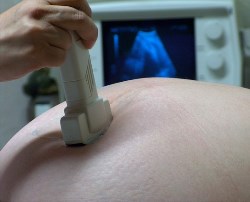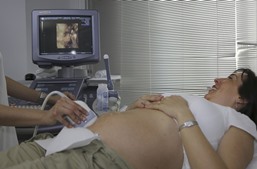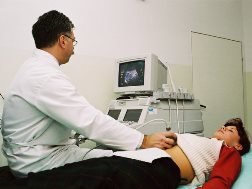How to Enroll in the Right Ultrasound Technician School near High Bridge Wisconsin
 Once you have made a decision to pursue an ultrasound technician degree near High Bridge WI, the next step is to start the process of picking a college. First, you need to find the ideal program that will provide the appropriate education to become a qualified professional. And given that some states do require that sonographers be either licensed or certified, depending on where you will practice you may also need preparation to pass a certification or licensing examination. So it’s very important that you research each school so that you can evaluate and compare your alternatives. But just where does one begin? A number of prospective students will begin by looking for colleges that are within commuting distance of their homes and then by comparing tuition. Certainly cost and location should be taken into account when arriving at a decision, but there are other critical factors also. Such as, if the ultrasound technician schools are accredited or if they provide internship programs. These and additional qualifications will be covered more in depth later in this article. But to start with, let’s review what an ultrasound tech does and the degrees and online education programs that are offered.
Once you have made a decision to pursue an ultrasound technician degree near High Bridge WI, the next step is to start the process of picking a college. First, you need to find the ideal program that will provide the appropriate education to become a qualified professional. And given that some states do require that sonographers be either licensed or certified, depending on where you will practice you may also need preparation to pass a certification or licensing examination. So it’s very important that you research each school so that you can evaluate and compare your alternatives. But just where does one begin? A number of prospective students will begin by looking for colleges that are within commuting distance of their homes and then by comparing tuition. Certainly cost and location should be taken into account when arriving at a decision, but there are other critical factors also. Such as, if the ultrasound technician schools are accredited or if they provide internship programs. These and additional qualifications will be covered more in depth later in this article. But to start with, let’s review what an ultrasound tech does and the degrees and online education programs that are offered.
Click Here to Get Free Information on Ultrasound Technician Schools!
Ultrasound Technician Work Summary
 There are various professional titles for ultrasound techs (technicians). They are also referred to as ultrasound technologists, sonogram techs, and diagnostic medical sonographers (or just sonographers). No matter what their title is, they all have the same basic job function, which is to implement diagnostic ultrasound procedures on patients. Even though many practice as generalists there are specializations within the field, for example in cardiology and pediatrics. The majority practice in High Bridge WI clinics, hospitals, outpatient diagnostic imaging centers and even private practices. Routine daily work duties of an ultrasound technician may consist of:
There are various professional titles for ultrasound techs (technicians). They are also referred to as ultrasound technologists, sonogram techs, and diagnostic medical sonographers (or just sonographers). No matter what their title is, they all have the same basic job function, which is to implement diagnostic ultrasound procedures on patients. Even though many practice as generalists there are specializations within the field, for example in cardiology and pediatrics. The majority practice in High Bridge WI clinics, hospitals, outpatient diagnostic imaging centers and even private practices. Routine daily work duties of an ultrasound technician may consist of:
- Keeping records of patient case histories and details of each procedure
- Counseling patients by explaining the procedures and answering questions
- Preparing the ultrasound machines for usage and then sterilizing and recalibrating them
- Escorting patients to treatment rooms and making them comfortable
- Operating equipment while limiting patient exposure to sound waves
- Reviewing the results and determining need for additional testing
Sonographers must frequently gauge the safety and performance of their equipment. They also are held to a high professional standard and code of conduct as health practitioners. In order to maintain that degree of professionalism and stay current with medical knowledge, they are mandated to enroll in continuing education training on an ongoing basis.
Sonogram Tech Degrees Available
 Sonogram tech enrollees have the opportunity to earn either an Associate or a Bachelor’s Degree. An Associate Degree will generally require about 18 months to 2 years to accomplish based upon the program and class load. A Bachelor’s Degree will require more time at as long as four years to complete. Another option for individuals who have already obtained a college degree is a post graduate certificate program. If you have received a Bachelor’s Degree in any major or an Associate Degree in a relevant health field, you can enroll in a certificate program that will require just 12 to 18 months to complete. One thing to bear in mind is that the majority of sonographer schools do have a clinical training component as a portion of their curriculum. It can often be satisfied by taking part in an internship program which many schools organize through High Bridge WI clinics and hospitals. When you have graduated from one of the degree or certificate programs, you will then have to comply with the licensing or certification prerequisites in Wisconsin or whatever state you choose to work in.
Sonogram tech enrollees have the opportunity to earn either an Associate or a Bachelor’s Degree. An Associate Degree will generally require about 18 months to 2 years to accomplish based upon the program and class load. A Bachelor’s Degree will require more time at as long as four years to complete. Another option for individuals who have already obtained a college degree is a post graduate certificate program. If you have received a Bachelor’s Degree in any major or an Associate Degree in a relevant health field, you can enroll in a certificate program that will require just 12 to 18 months to complete. One thing to bear in mind is that the majority of sonographer schools do have a clinical training component as a portion of their curriculum. It can often be satisfied by taking part in an internship program which many schools organize through High Bridge WI clinics and hospitals. When you have graduated from one of the degree or certificate programs, you will then have to comply with the licensing or certification prerequisites in Wisconsin or whatever state you choose to work in.
Ultrasound Tech Online Programs
 As previously mentioned, virtually all sonogram technician schools have a clinical component to their programs. So while you can earn a certificate or degree online, a substantial part of the training will be either held in an on campus lab or at a sponsored off-campus medical care provider. Practical training can usually be satisfied through an internship at a local High Bridge WI outpatient clinic, hospital or private practice. However the balance of the classes and training may be accessed online in your High Bridge home. This is especially beneficial for those students that continue working while obtaining their degrees. Plus online programs are many times more affordable than on-campus options. Costs for study materials and commuting can be lessened also. But similarly as with any ultrasound tech college you are looking at, verify that the online school you ultimately pick is accredited. Among the most highly respected accrediting agencies is the Commission on Accreditation of Allied Health Education Programs (CAAHEP). Accreditation is especially significant for licensing, certification and finding employment (more on accreditation later). So if you are disciplined enough to learn away from the classroom in the convenience of your own home, then an online degree could be the right choice for you.
As previously mentioned, virtually all sonogram technician schools have a clinical component to their programs. So while you can earn a certificate or degree online, a substantial part of the training will be either held in an on campus lab or at a sponsored off-campus medical care provider. Practical training can usually be satisfied through an internship at a local High Bridge WI outpatient clinic, hospital or private practice. However the balance of the classes and training may be accessed online in your High Bridge home. This is especially beneficial for those students that continue working while obtaining their degrees. Plus online programs are many times more affordable than on-campus options. Costs for study materials and commuting can be lessened also. But similarly as with any ultrasound tech college you are looking at, verify that the online school you ultimately pick is accredited. Among the most highly respected accrediting agencies is the Commission on Accreditation of Allied Health Education Programs (CAAHEP). Accreditation is especially significant for licensing, certification and finding employment (more on accreditation later). So if you are disciplined enough to learn away from the classroom in the convenience of your own home, then an online degree could be the right choice for you.
Questions to Ask Ultrasound Technician Schools
 When you have decided on the type of degree or certificate that you would like to earn, you can initiate the procedure of reviewing and comparing ultrasound technician schools. You may first want to decide whether you would rather attend classes online or travel to a school campus in the High Bridge WI area. Naturally location will be critical if you choose the latter, and the cost of tuition undoubtedly will be an initial qualifier as well. But there are other variables that you should also take into account, for instance if the programs are accredited and if they offer internship programs. So in order to perform your due diligence so that you can make your final selection, below are several questions that you need ask each ultrasound tech program before deciding.
When you have decided on the type of degree or certificate that you would like to earn, you can initiate the procedure of reviewing and comparing ultrasound technician schools. You may first want to decide whether you would rather attend classes online or travel to a school campus in the High Bridge WI area. Naturally location will be critical if you choose the latter, and the cost of tuition undoubtedly will be an initial qualifier as well. But there are other variables that you should also take into account, for instance if the programs are accredited and if they offer internship programs. So in order to perform your due diligence so that you can make your final selection, below are several questions that you need ask each ultrasound tech program before deciding.
Are the Sonogram Technician Schools Accredited? The majority of sonogram tech colleges have acquired some type of accreditation, whether national or regional. Nevertheless, it’s still important to confirm that the school and program are accredited. Among the most highly regarded accrediting organizations in the field of sonography is the Joint Review Committee on Education in Diagnostic Medical Sonography (JRC-DMS). Programs earning accreditation from the JRC-DMS have gone through a rigorous review of their teachers and course materials. If the college is online it can also obtain accreditation from the Distance Education and Training Council, which targets distance or online learning. All accrediting agencies should be acknowledged by the U.S. Department of Education or the Council on Higher Education Accreditation. Along with ensuring a premium education, accreditation will also assist in securing financial aid and student loans, which are often not available for non-accredited programs. Accreditation may also be a pre-requisite for licensing and certification as required. And many High Bridge WI employers will only hire a graduate of an accredited program for entry level jobs.
Are Internships Sponsored? Ask if the ultrasound tech programs you are assessing have associations with High Bridge WI clinics or hospitals for internship programs. Internships are not only a great way to get hands on training in a clinical environment, they are also a way to fulfill the clinical training requirement for the majority of programs. As a secondary benefit, they can help graduates and students develop professional relationships in the High Bridge health care community and help with obtaining employment.
Is Job Placement Assistance available? You will probably want to hit the ground running after graduating, but finding that initial job in a new profession can be difficult without assistance. Find out if the ultrasound tech programs you are assessing have job placement programs and what their success rates are. Rapid and high placement rates are an excellent sign that the schools have substantial networks and great relationships with Wisconsin healthcare employers. It also substantiates that their graduates are well regarded and in demand.
Where is the College Located? For many students, the college they pick will need to be within travelling distance of their High Bridge WI home. Students who have chosen to attend classes online obviously will not have to worry themselves with the location of the campus. However, the availability of local internships will be of concern. One thing to bear in mind is that if you choose to enroll in a program that is out of state or perhaps out of your local area, you may be required to pay a higher tuition. State colleges typically charge higher tuitions for out of state residents. And community colleges typically charge a higher tuition for those students that don’t reside within their districts.
How Large are the Classes ? Unless you are the sort of student that likes to sit way in the back of the classroom or hide in the crowd, you will likely prefer a small class size. Small classes allow for more individual participation and personalized instruction. Ask the schools you are looking at what the average teacher to student ratio is for their classrooms. If practical you may prefer to sit in on one or more classes before making your final decision. This will also give you a chance to talk with a few of the students and instructors to get their perspectives regarding the sonogram tech program also.
Does the School Accommodate your Schedule? And last you must confirm that the sonographer college you finally choose can furnish the class schedule you need. This is especially important if you choose to continue working while you attend classes. If you need to schedule night or weekend classes in the High Bridge WI area, confirm that they are offered. If you can only attend part-time, find out if that is an alternative and how many courses or credit hours you would have to enroll in. Also, find out what the protocol is for making up any classes that you might miss due to illness, work or family emergencies.
One Year Ultrasound Programs High Bridge Wisconsin
 Enrolling in the right ultrasound technician certificate or degree program is a crucial first step to starting a fulfilling new profession furnishing diagnostic services to patients. Ultrasound technician programs require that you have earned a high school diploma or a GED. In addition to satisfying academic requirements, you need to be in at least fairly good physical health, able to stand for prolonged durations with the ability to routinely lift weights of 50 pounds or more, as is it typically necessary to position patients and move heavy equipment. Additional beneficial skills include technical aptitude, the ability to remain calm when faced with an anxious or angry patient and the ability to converse in a clear and compassionate manner. You originally came to this website due to an interest in One Year Ultrasound Programs and wanting more information on Accredited Ultrasound Technologist Schools. However, as we have covered in this article, there are multiple questions that you should ask each program you are looking at. This is the case whether you enroll in an online program or travel to the school campus to attend classes. And by asking the proper questions so that you can assess each program, you can narrow down your alternatives until you are left with the ideal school for your education. And with the right training, discipline and determination to succeed, you can reach your goal to work as an sonographer in High Bridge WI.
Enrolling in the right ultrasound technician certificate or degree program is a crucial first step to starting a fulfilling new profession furnishing diagnostic services to patients. Ultrasound technician programs require that you have earned a high school diploma or a GED. In addition to satisfying academic requirements, you need to be in at least fairly good physical health, able to stand for prolonged durations with the ability to routinely lift weights of 50 pounds or more, as is it typically necessary to position patients and move heavy equipment. Additional beneficial skills include technical aptitude, the ability to remain calm when faced with an anxious or angry patient and the ability to converse in a clear and compassionate manner. You originally came to this website due to an interest in One Year Ultrasound Programs and wanting more information on Accredited Ultrasound Technologist Schools. However, as we have covered in this article, there are multiple questions that you should ask each program you are looking at. This is the case whether you enroll in an online program or travel to the school campus to attend classes. And by asking the proper questions so that you can assess each program, you can narrow down your alternatives until you are left with the ideal school for your education. And with the right training, discipline and determination to succeed, you can reach your goal to work as an sonographer in High Bridge WI.
More Ultrasound Locations in Wisconsin
Wi-Fi
Wi-Fi (/ˈwaɪfaɪ/)[1] is a family of radio technologies that is commonly used for the wireless local area networking (WLAN) of devices which is based around the IEEE 802.11 family of standards. Wi‑Fi is a trademark of the Wi-Fi Alliance, which restricts the use of the term Wi-Fi Certified to products that successfully complete interoperability certification testing.[2][better source needed] Wi-Fi uses multiple parts of the IEEE 802 protocol family and is designed to seamlessly interwork with its wired sister protocol Ethernet.
Devices that can use Wi-Fi technologies include desktops and laptops, smartphones and tablets, smart TVs, printers, digital audio players, digital cameras, cars and drones. Compatible devices can connect to each other over Wi-Fi through a wireless access point as well as to connected Ethernet devices and may use it to access the Internet. Such an access point (or hotspot) has a range of about 20 meters (66 feet) indoors and a greater range outdoors. Hotspot coverage can be as small as a single room with walls that block radio waves, or as large as many square kilometres achieved by using multiple overlapping access points.
The different versions of Wi-Fi are specified by various IEEE 802.11 protocol standards, with the different radio technologies determining the ranges, radio bands, and speeds that may be achieved. Wi-Fi most commonly uses the 2.4 gigahertz (12 cm) UHF and 5 gigahertz (6 cm) SHF ISM radio bands; these bands are subdivided into multiple channels. Each channel can be time-shared by multiple networks. These wavelengths work best for line-of-sight. Many common materials absorb or reflect them, which further restricts range, but can tend to help minimise interference between different networks in crowded environments. At close range, some versions of Wi-Fi, running on suitable hardware, can achieve speeds of over 1 Gbit/s.
